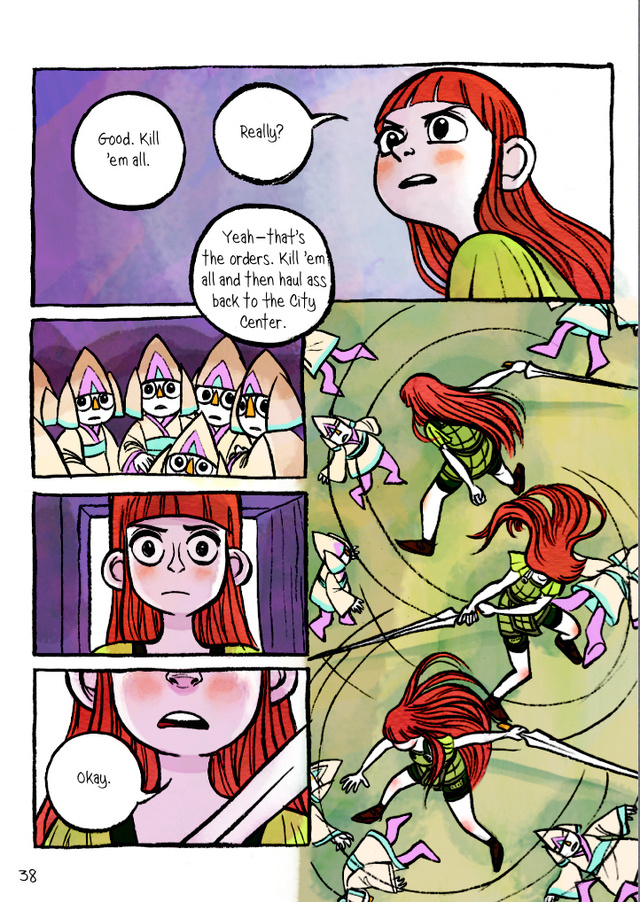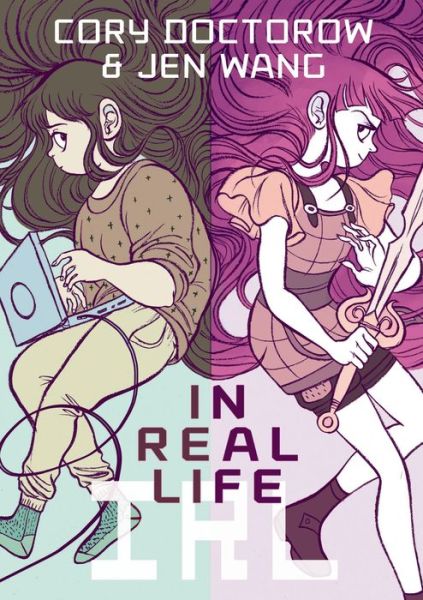The arbitrary line drawn between the internet and “real life” is a long-standing pet peeve of mine. When I was a kid, it came in the form of well-intentioned family and friends telling me that my online relationships weren’t real. As an adult, it has been any number of folks from across the political spectrum belittling “Twitter activism” and other online forms of dissent—whether because it doesn’t work, or because, in their strangely drawn rulebooks, it doesn’t count as real action.
Cory Doctorow and Jen Wang’s graphic novel, In Real Life, hits both of these notes with grace while staying true to the playfulness and fun that draw so many of us to online spaces in the first place.
The protagonist, Anda, is a teenager and a gamer—not an activist in any traditional sense. But even going on quests and killing monsters has its real life effects, especially when the players in your party are living and breathing on the other side of the computer screen. Doctorow, known for his YA fiction, blogging, and activism, is well equipped to write a story that he describes in the introduction as “connect[ing] the dots between the way we shop, the way we organize, and the way we play, and why some people are rich, some are poor, and how we seem to get stuck there.”
Anda joins the MMORPG Coarsegold under her mother’s strict condition that she doesn’t talk to any strange older men in the process. That doesn’t stop her from talking to Sarge, though—an aggressive, larger-than-life girl her own age, who quickly recruits Anda in her quest to kill gold farmers. Gold farmers are cheaters, Sarge explains—they rake up gold, items, and experience in gameplay and sell it for real-life money. Anda is a natural. As she gains experience, her confidence grows in gameplay and out. Then, she makes the mistake of talking to a gold farmer. Raymond is a teen gamer, just like her, from China. For him, though, gaming is a job—something he does in lieu of lifting boxes or making zippers. When Anda finds out that Raymond can’t afford to go to the doctor, she begins a new, higher-stakes quest: to change someone’s life from across the globe. But it’s not nearly as simple—or as righteous—as she thought it would be.

Wang’s soft, almost muted style and Doctorow’s unpretentious writing work in tandem to question the easy morality we often associate with gaming and activism alike. What do we choose to organize for and against, and who, exactly, is the bad guy? Sarge tells Anda that if a player doesn’t speak English, they’re probably a bot and she should “probably kill ‘em.” It’s one of the comic’s most literal instances of the online/IRL divide—not only can they not tell who is “real,” but their method of judgment is based in real-life prejudice and has real-life effects. However, Doctorow seems careful to emphasize the flipside of the online/IRL-divide: Just because you read about it online, doesn’t mean you understand it. When Anda gets involved with Raymond’s work life, one of his coworkers tells her, “Nice job American. You don’t know anything about us. Next time stick to your own game.” Anda’s lesson here is a complicated one—one without easy, black-and-white answers—and In Real Life doesn’t shy away from that.
Besides all of its commentary on internet activism and global economics, IRL does an amazing job in its portrayal of the gatekeeping and bullying that has made recent headlines in the gaming community. Besides Sarge and Anda virtually terrorizing an entire swath of Coarsegold players, we also see Anda at school as her nerdy friends bad-mouth the earnest “prep” that wants to introduce D&D to her board game club. Doctorow especially emphasizes the gendered bullying that Sarge and many others have experienced at the hands of male gamers, and the various ways that female gamers work to reclaim Coarsegold for themselves.
IRL is very much a story of who has power on and off-screen, and who can exploit the game for their own ends. It might be heavy-handed if it weren’t such a sweet, ordinary life kind of book. Jen Wang’s art is genuinely gorgeous—she captures fun action sequences as well as she does the quieter moments of Anda’s life, at home or at school. It’s that attention to both of Anda’s worlds that makes IRL a breath of fresh air. Its complex conflicts do not detract for a second from the story’s simple structure or earnest optimism. IRL may address my annoyance at the anti-online activism crowd, but it also provides me with adorable, fantastical sprites, a fighting tiger familiar, and a portrayal of a high school experience as recognizable as it is heartfelt.
In Real Life is available October 14th from First Second.
Read an excerpt from the graphic novel and check out the Tor.com original comic Con/Game, set in the same universe.
You can also read Doctorow’s original short story, “Anda’s Game” at Salon.
Emily Nordling is a writer and reader living in Chicago, IL. She thrives primarily on tea, books, and social justice.










